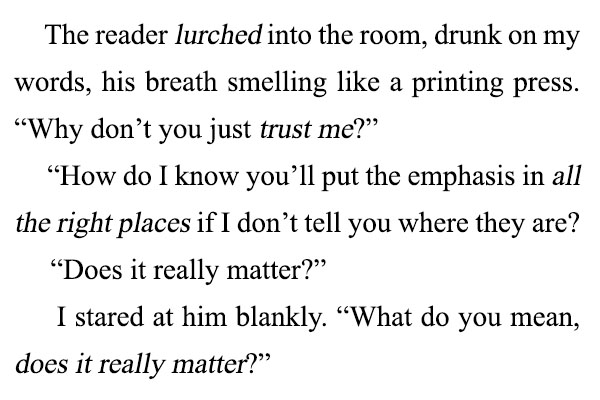
I started in on my edits from the amazing Gus Li today for The Dragon Eater, book one of the Tharassas Cycle. Yeah, I know. Been working on this thing forever. More on that front soon.
These books have a lot of mind-to-mind talk between humans and other creatures, and I signify it with italics and an en dash at the start and finish:
-Are you sure that’s wise? It might be confusing for the reader.-
Shut up. Can’t you see I’m writing here?
-Let’s see… drooling, fingers sticky with chocolate, blank expression on your face… yeah, you’re writing.-
*shoves inner critic under the desk*
So where was I? Oh yeah. I am a serial italics abuser. I also overuse em dashes and ellipses, but that’s a conversation for another time.
I’m a wordsmith, and sentences have a certain meter, an ebb and flow that I can hear in my head. Sometimes I want to give something a little more oomph:
“I can’t believe you’re just calling me back now.”
See, he’s pissed off that his boyfriend Magnus is too busy for him, and he really wants to make that point.
-Maybe he should have paid more attention to Magnus last night over dinner.-
You wanna be the writer?
-No.-
Okay then. So as I was saying, I’d throw some italics in for emphasis:
“I can’t believe you’re just calling me back now.”
As the author, I am telling you how mad he is, in part by using italics to push the word “just” a little harder.
But is it really necessary?
-I was just wondering the same thing.-
Gus’s point is that it creates visual conflicts with so many other uses of italics in my story. But I think it’s also a way to control the reader’s experience. I want you to hear it my way for maximum impact.
-Always gotta be in control…-
*kicks critic in the groin*
-Moans.-
The whole thing reminded me of an old story about a reader who waxes poetic about the author’s color choice:
Reader: “I get it. You chose blue because the protagonist is in such a bleak place after the death of his mother. The blue externalizes and represents the deep sadness the character feels, and the golden ray of sunshine through the window is the bit of hope that leads him on.”
Author: “Actually, I just like blue.”
-You hate blue.-
I love blue.
-Then why do you always wear black or gray? Ah, Is that an externalization of your bleak and empty mind that blggrr…-
*closes lid on trash can*
So sorry about that, folks.
When we let go of our work and send it out into the world, it becomes, in a sense, no longer ours. It now belongs to readers, too, and they are going to interpret it through their own lenses, no matter what we intended or how we tried to shape it for them.
So I’m letting go of italics for emphasis in my work. I’ll let the reader figure out where to stress things, leaving the door open for a little interpretive magic.
Except where I really think they need to know.
-Just can’t help yourself, can you?-
To my writer friends, how do you try to control the reader’s experience? Has someone ever surprised you by seeing your work in a wholly unexpected way?
